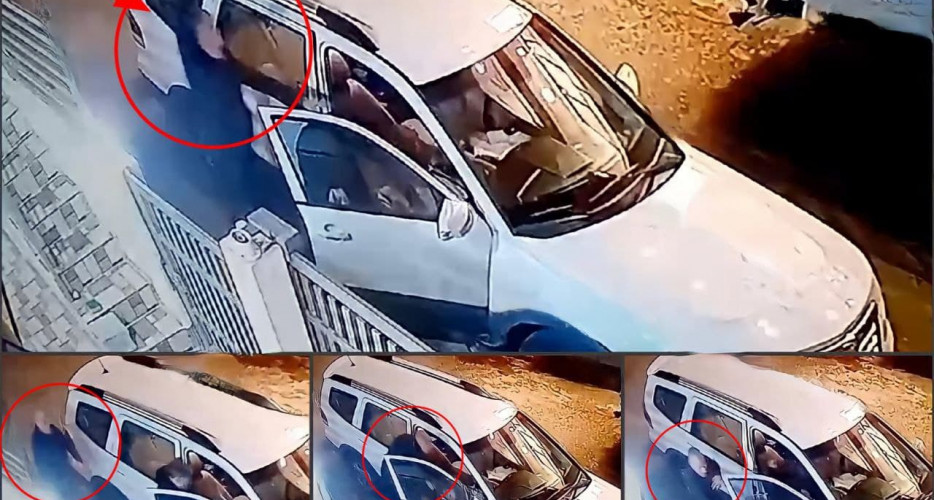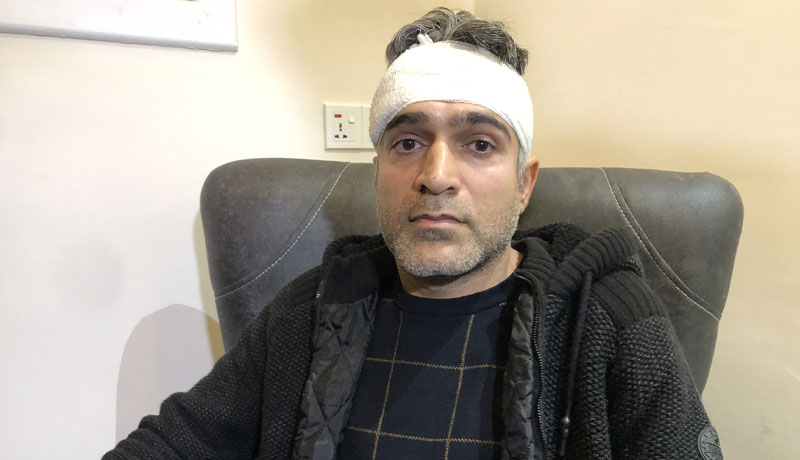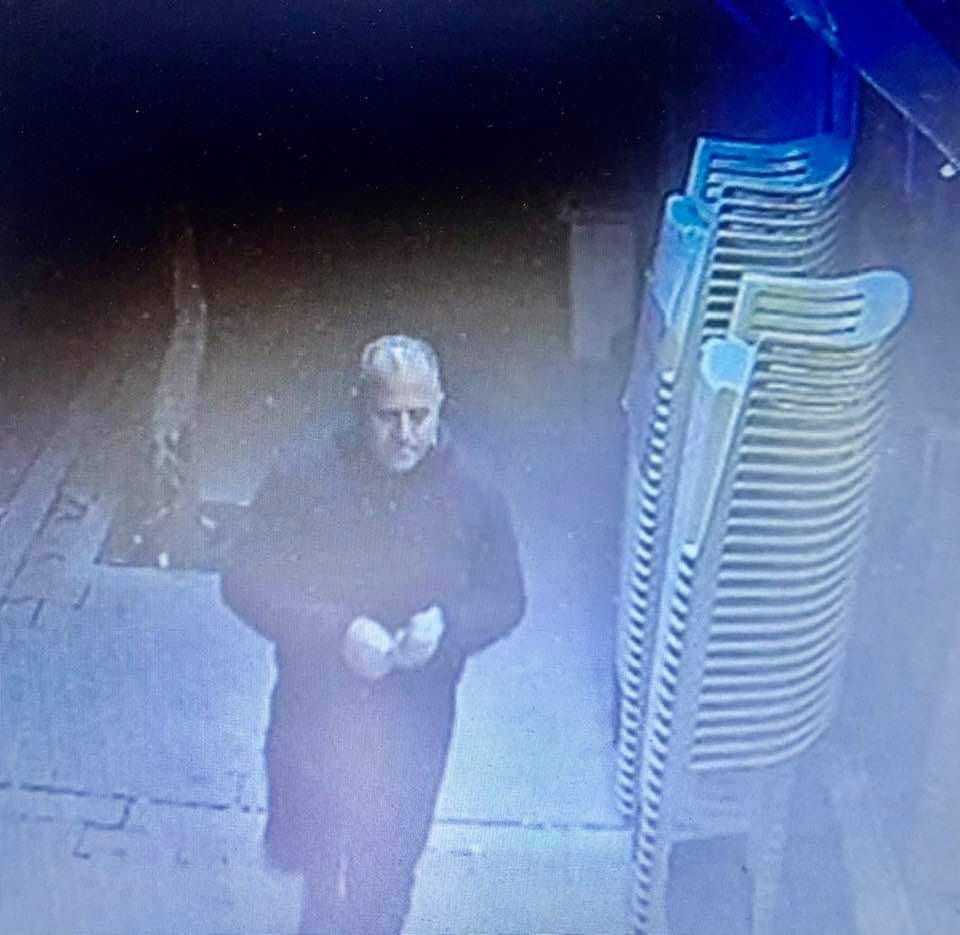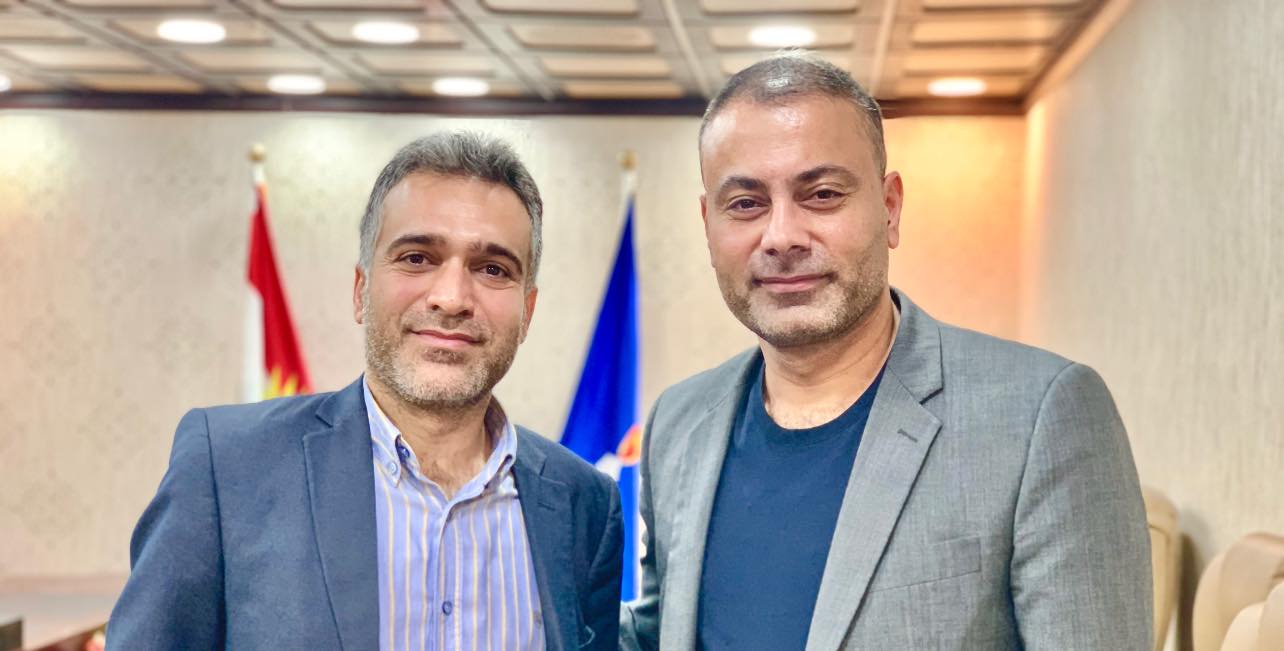
PEREGRAF– Surkew Mohammed
More than three weeks have passed since the brutal attack on Iraqi parliamentarian Ghalib Muhammad outside his home in Sulaimaniyah. The identity of the perpetrator was quickly exposed using photographs and videos of the attack, but he has not been arrested. The lawmaker cannot envision an easy resolution and is seeking justice by transferring the case to Baghdad.
Muhammad is a member of the Change Movement (Gorran) and the Hope Alliance in Iraq’s Council of Representatives. The latter grouping is composed of MPs in Baghdad who are not part of the Kurdistan Democratic Party (KDP) or the Patriotic Union of Kurdistan (PUK) and is generally critical of those two parties. They consider the attack to be an "attempt to assassinate Muhammad," but the case is being treated by the Sulaimaniyah police as a case of "fighting between normal people."
The attack elicited a strong public and political response and was subsequently used as fodder for discord between the KDP and PUK and their affiliated security forces. Three people who were initially detained in relation with the incident were released "under pressure" from the KDP, according to a high-ranking source with knowledge of the case.
"The three men were senior and belonged to the KDP’s Parastin Intelligence Agency, " the source told PEREGRAF.
"[They] remained in jail for one night and were later released under pressure from the KDP. PUK Co-President Lahur Sheikh Jangi told the Hope Alliance that the three people were involved in the attack and admitted that they had sheltered the alleged perpetrator who attacked [Muhammad]," the source told PEREGRAF.
"They said the goal was to kill him and also named [fellow Goran and Hope Alliance MP] Hoshyar Abdullah as another potential target," the source said.
"Masoud Barzani himself called Qubad Talabani and put strong pressure on him to free those people, saying that we will go to two administrations over this issue," the source added, referring to the divided governance system that existed in the 1990s.
The attack and the criminal’s escape
Strongly critical of the Kurdistan Regional Government and the two ruling parties, Muhammad was in Sulaimaniyah’s Saholaka neighborhood on the evening of February 26 before returning to his home on Taza Street.
According to video of the attack, after parking the car out in front of his house, Muhammad rang the doorbell and opened a passenger-side door in order to collect some items from the vehicle. At that point, a man appeared behind him and struck him on the head with brass knuckles, before pushing him into the car and hitting him several more times.
In the hours immediately after the incident, a picture taken from a CCTV camera installed at the lawmaker’s house was used to identify the alleged perpetrator as Hamid Sur, who was previously known to the security forces. Sur is married and a resident of Sulaimaniyah, but brazenly carried out the attack without covering his face.
"It has been revealed in the CCTV that Sur waited at the house for Muhammad to return. He had an accomplice and he was warned when Muhammad went home from Saholaka," a separate source, speaking on condition of anonymity, told PEREGARF.
After attacking the lawmaker, Sur initially escaped on foot to Qanat Street, a busy downtown thoroughfare, where he hailed a taxi and left the area.
According to information from the security forces, Sur allegedly went to Piramerd Street in the taxi and holed-up in a barbershop for the night, where he was sheltered by one of the three people who were later arrested and released under partisan pressure, an informed source said.

Ghalib Muhammad
Rushed to the hospital, Muhammad was injured in 12 places on his upper body and required 24 stitches. He was released that night to recuperate at home.
He told journalists: "Friends and enemies should know that we will continue to defend the people even if I have to sacrifice my life for it."
Later, the security forces arrested Sur’s wife, who said that she was unaware of her husband’s actions, an informed source said.
In the weeks following the attack, he has not been located or taken into custody.
It has been More three weeks and Hamid Sur remains at large
"There is only one arrest warrant and it is for Sur. So far, there is no arrest warrant for any other person," Spokesman for the Sulaimaniyah Police Sarkawt Ahmed told PEREGRAF.
Ahmed also professed to be unaware of the apparent arrest of the three other men alleged to be linked to the KDP.
"It has nothing to do with the police. We have talked about it before and we have not received any other arrest warrants and an arrest warrant has been issued only for Sur," he continued.
"We don't know if he left Sulaimaniyah or not and we're still looking for him."

A picture of Hamida Sur appeared on the night of the attack on a street CCTV near Ghalib Muhammad's house.
The Sulaimaniyah Asayish will not discuss the case because it has not been sent to them by the police, the source said. The Asayish in Sulaymaniyah is affiliated with the PUK and typically handles security, political, terrorism, and narcotics cases.
"This case however is being treated as a normal fight between two people and has been viewed as a normal case, so it has not been sent to the Asayish and is with the police," the source added.
Iraqi intelligence service warns MPs
On January 27, Hoshyar Abdullah, another Gorran MP and Hope Alliance member, was sitting in a meeting of the Council of Representatives’ Finance Committee when his phone rang with a call from the Iraqi intelligence services.
An officer introduced himself as a brigadier general and said: "This is an official phone call and the head of the intelligence agency is aware of a threat to your life and there will be an attempt on Saturday."
The intelligence officer had three instructions for Abdullah: "First, don't talk about this in the media. Second, take security measures and make sure your guards are with you. Third, if you can leave Baghdad, do so," Abdullah told PEREGRAF.
Afterwards, Abdullah discussed the contents of the phone call with Ahmad Haji Rashid and Jamal Kochar, other members of the committee, who then also raised the matter with Muhammad Tamim, another committee member.
They then confirmed with a major general in the intelligence services that the call and the threat was genuine.
Abdullah left Baghdad that day and returned to Sulaimaniyah. The same phone call with the same message was made to Muhammad, who was in Sulaimaniyah at the time.
The day of the attempt was to be January 30 and neither MP planned to be in Baghdad as a precaution.
Abdullah returned to Baghdad the following Sunday amid tight security measures, even in the Green Zone.
"I was going to a meeting with Ahmad Haji Rashid and often changing cars," he said.
At some point, both MPs were given the same warning by the PUK’s Zanyari intelligence agency.
On February 2, Head of the Gorran caucus in the Council of Representatives Yusuf Muhammad sent an official letter to Iraq’s parliament speaker, prime minister, and president about the threat. Prime Minister Mustafa al-Kadhimi ordered the interior ministry and the intelligence service to investigate and monitor the situation. Speaker Muhammed al-Halbousi told the MPs that necessary measures would be taken.
At the same time, PUK Co-President Sheikh Jangi discussed the issue with Kadhimi, who assured the him that nothing would happen in Sulaimaniyah, an informed source told PEREGRAF.

Hoshyar Abdullah and Ghalib Muhammad
"We warned the Iraqi presidencies and the security forces of the Kurdistan Region of this danger and they promised to protect us, but unfortunately in Sulaimaniyah a promise has not been fulfilled and an attempt was made to assassinate Ghalib Muhammad," said Sarkawt Shamsaddin, a member of parliament from the Hope Alliance and a close friend of Muhammad told the PEREGRAF.
Following the warning from the intelligence service, Muhammad decided to set up a CCTV system at his home 10 days before he was attacked.
"We think the KDP is behind the incident and they have rescued the criminal and it is clear that three people have been released as a result of pressure from the KDP. The KDP is a centralized organization and those people did not do it without orders from above them," said Shamsaddin.
"The attack was three weeks ago and the CCTV revealed that Sur and some other people were going through Muhammad’s alley," he added.
Muhammad, who is waiting for news of the arrest of the man who attacked him, also wants to know who is behind the assassination attempt and for that information to be revealed publicly during a trial.
"I still don't know what he has done and I don't want to interfere in it, so that they can’t say ‘he has interfered.’ The relevant parties are calling and they say ‘we're trying to find him.’ I also see some information from the media and I don't want to interfere," Muhammad told PEREGRAF.
"The identity of the man is obvious and everyone knows who he is and the only thing left is to arrest him," Muhammad said, adding that the perpetrator should have been arrested by now.
According to Abdullah, until the perpetrator of the attack and the people behind him are arrested, "the PUK is responsible because it happened [in an area] under their control."
Transferring the case to Baghdad
The Hope Alliance is not confident that the KRG’s security forces, courts, and institutions will see justice served in Muhammad’s case.
"We are disappointed in the investigation of the security forces and the courts of Kurdistan, both zones, the PUK and the KDP, so we will try to transfer the case to Baghdad," Shamsaddin said.
The Hope Alliance officially sent a letter to the head of the Council of Representatives on March 8 seeking such a transfer. The same day, the speaker sent an official letter (numbered “239”) to Head of the Iraqi Supreme Judicial Council Fayaq Zedan requesting he take action.
On March 11, Hope Alliance MPs Shamsaddin, Muhammad, and Kawa Muhammad met with Zedan to follow up.
"He is eagerly ready to take the necessary measures," the MPs said in a statement after the meeting.
"The authorities [in the Kurdistan Region] are using the courts for partisan purposes and interests and do not allow them to fulfil their professional role," they continued, calling on the Supreme Judicial Council to eliminate partisan influence over the courts throughout Iraq, including the Kurdistan Region.
The CCTV footage of the moment Ghalib Muhammad being attacked in front of his house in Sulaimani on February 26, 2021
Rivalry between PUK and KDP intersects with Muhammad’s case
Although the KRG formally condemned the attack immediately after it happened and a spokesman for KRG Deputy Prime Minister Qubad Talabani, a senior member of the PUK, promised to punish the perpetrator, Sur remains at large.
No official statements or information were given to journalists until six days after the incident when Sheikh Jangi did so on Twitter on March 3, mixing it with a partisan broadside against KRG Prime Minister Masrour Barzani, a senior KDP leader.
"They started court work to free these three people and to ignore those things they did, so the head of the government will tell you here that you have lost trust completely or you would not have accepted this," Sheikh Jangi said of Barzani.
"The same government in the case of the arrest of five activists in Badinan called on all parties not to interfere in the court's affairs is the same government that … released three KRG intelligence officers, who were arrested in the case of attacking parliamentarian Ghalib Muhammad," he added.
Sheikh Jangi's tweet clearly indicated that those arrested and those who pressured for them to be released were from the KDP.
However, the PUK co-leader also showed his weakness by being unable to arrest the main perpetrator of an attack in the middle of a city controlled by his party, while being forced to release the alleged accomplices.
Within hours, the KRG spokesman responded to Sheikh Jangi, describing earlier controversies in the PUK-controlled zone without mentioning who was behind the attack on Muhammad or directly responding to Sheikh Jangi's criticism.
"The head of the government reaffirms his full support for the courts in the Kurdistan Region fairly and independently, far from the agenda and interests of any party, and without the pressure of the political parties, to decide on all cases and no case will be ignored," the KRG spokesman said.
After that tweet and response, Muhammad's case became part of a war of words between Sheikh Jangi and Barzani on TV and social media.
Although the PUK is a major component in the KRG’s coalition cabinet, the Sheikh Jangi wing of the PUK is seen as having a significant rivalry with Prime Minister Barzani’s faction of the KDP.
Baghdad has now become a place of hope for parliamentarians and their eyes are on it. After the case was transferred, a judge from Baghdad ordered the arrest of the main suspects and all those involved in perpetrating the attack.
PEREGRAF contacted Mahmoud Mohammed, the official spokesman for the KDP, to receive an official statement on the case, but he did not respond.